To Hattie McDaniel – a pioneer and artist.
Hattie McDaniel was born on June 10, 1895, to a family of entertainers in Wichita, Kansas. She was her parents’ 13th child. Her father, Henry, was a Baptist minister who played the banjo and performed in minstrel shows. Her mother, Susan Holbert, was a gospel singer. In 1901, McDaniel and her family moved to Denver, Colorado.
Hattie showed a proclivity toward entertaining herself while still in elementary school and became a show business professional while still in high school when she started singing, dancing and performing funny skits in minstrel shows. Deciding to leave school in 1910, Hattie began training with her father’s minstrel troupe full-time. In 1920, she became a member of Professor George Morrison’s orchestra, and toured with his and other vaudeville troops for the next five years. In 1925, she was invited to perform on Denver’s KOA radio station. The performance gave McDaniel the distinction of being one of the first African-American women to sing on the radio.
Following her radio performance, McDaniel continued to work the vaudeville circuit for the next few years and when work was slow she worked odd jobs to supplement her income. Much to her relief, in 1929, Hattie landed a steady gig as a vocalist at Sam Pick’s Club in Milwaukee.
A year or so later, McDaniel’s brother, Sam, and sister, Etta, convinced her to move to Los Angeles, where they had managed to procure minor movie roles for themselves. Sam was also a regular on a KNX radio show, called The Optimistic Do-Nuts. Not long after arriving in L.A., McDaniel had a chance to appear on her brother’s radio show. She was a quick hit with listeners. (Biography.com)
After several bit roles in film, Hattie McDaniel got her first major on-screen break in 1934, singing a duet with Will Rogers in John Ford‘s Judge Priest. Here is a short compilation of Hattie in Judge Priest where she shows she was an all-around entertainer:
The following year, McDaniel was awarded the role of Mom Beck, starring opposite Shirley Temple and Lionel Barrymore in David Butler’s, The Little Colonel.
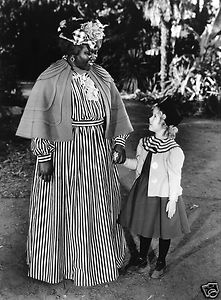
Her role in The Little Colonel gained McDaniel the attention of Hollywood directors, and was followed by a steady stream of offers.
In 1939, McDaniel accepted a role that would mark the highlight of her entertainment career – as Mammy in Victor Fleming’s, Gone with the Wind.
And, as we all know, she went on to make history when she won the Academy Award for Best Supporting Actress of 1939 for her portrayal of Mammy. Here is her moving, history-making acceptance speech:
Later, during World War II, McDaniel helped entertain American troops and promoted the sale of war bonds. She became Chairman of the Negro Division of the Hollywood Victory Committee during which she’d lead groups of entertainers in performances for the troops.

Through the mid-1940s, Hattie McDaniel appeared in additional films, primarily playing roles that members of the post-war progressive black community were beginning to cite as offensively old-fashioned. Since playing Mom Beck in The Little Colonel, McDaniel had been attacked by the media for taking parts that perpetuated a negative stereotype of blacks; she was criticized for playing servants and slaves who were seemingly content to retain their role as such. (Biography.com)
Hattie McDaniel defended her choice of film roles by stating it was her right to choose whatever roles she deemed appropriate, always voicing an appreciation for the life Hollywood afforded her. She suggested that characters like Mammy proved themselves as more than just measuring up to their employers.
As times changed and voices against how African-Americans were depicted in media grew louder, the roles that were being offered to Hattie McDaniel began to gradually disappear until movie offers stopped coming altogether. The actress reacted to the decline by returning to radio in the late 1940s and on November 24, 1947 she accepted the starring role on CBS radio’s The Beulah Show, earning $1,000 a week. Although McDaniel was once again playing a maid, she managed—to the NAACP’s approval—to use her talents to break racial stereotypes rather than reinforce them.
Immediately upon McDaniel’s joining the show, Beulah’s ratings doubled. Not only had Hattie McDaniel become the first African-American to win an Academy Award, she was now also the first African-American woman to star in a network radio program.
In 1951, McDaniel started filming for a television version of The Beulah Show, in which she starred until she became ill in 1952. When Hattie was diagnosed with breast cancer that year, actress Louise Beavers stepped in to take over the role.
Here’s an episode of The Beulah Show from August 5, 1952 titled, “The Waltz”
Hattie McDaniel lost her battle with cancer in Los Angeles, California, on October 26, 1952.
Since her death, McDaniel has been posthumously awarded two stars on the Hollywood Walk of Fame. Additionally, in 1975, she was inducted into the Black Filmmakers Hall of Fame. (Biography.com)
Needless to say it’s a shame that despite her talent, accomplishments and popularity, Hattie McDaniel was left with little choice but to play stereotypical roles in all manner of media for her entire career, as described above. Still, she portrayed every single role with dignity and grace saying famously that she would rather play a maid than be one. In that regard, as a fan, I’d rather see her than not and I’m grateful we have her to enjoy through these classic clips. I’d be remiss not to mention, however, that we can’t ignore the racism she and other African-American artists had to endure, which make Ms. McDaniel’s accomplishments loom larger still.
To put how difficult it must have been in perspective, when Hattie McDaniel stepped up to the podium in 1940 to accept her Oscar, she was not only making history with the win, she was also doing so by being the first ever black guest at the Academy Awards. She was a brave lady and that day was about much more than a gathering to commemorate performance in film.
Here’s a lovely tribute to cap things off – a gallery of clips – aptly accompanied by “Tara’s Theme” from Gone with the Wind, the beloved classic epic, which would not have been as beloved, as classic or as epic without Hattie McDaniel:
Remembering one of the greats.
As its star of the day on August 20, TCM will feature 24 hours of the films of Hattie McDaniel. Be sure to tune in or set your DVRs. Here is the schedule.
All biographical information courtesy of Biography.com.
____________________________________________________
This post is submitted to the Summer Under the Stars Blogathon (SUTS) (2013), hosted by Jill of Sittin’ On a Backyard Fence and Michael of Scribehard on Film. The blogathon coincides with Turner Classic Movies’ SUTS event, which lasts all of August each year with each day focused on a different classic star. Be sure to visit either host site to enjoy entries honoring some of the greatest stars to appear on the silver screen all month long. Also, be sure to tune in to TCM every single day in August or set your DVRs. For classic film fans this is as grand as it gets.



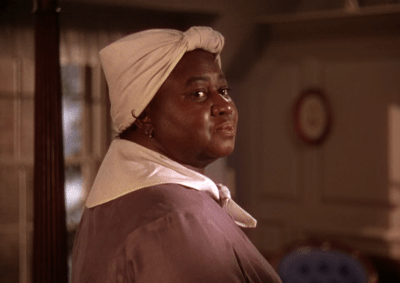


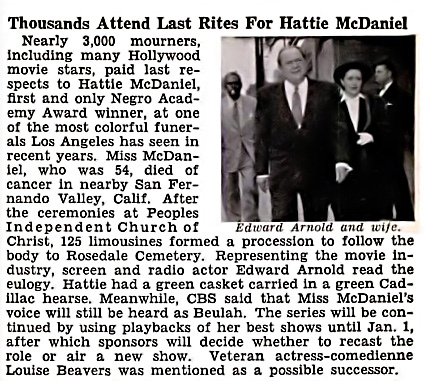
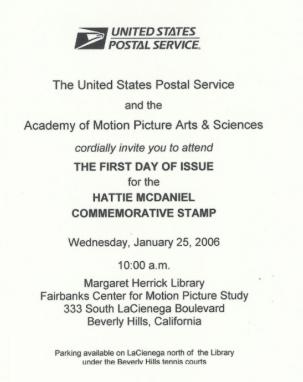
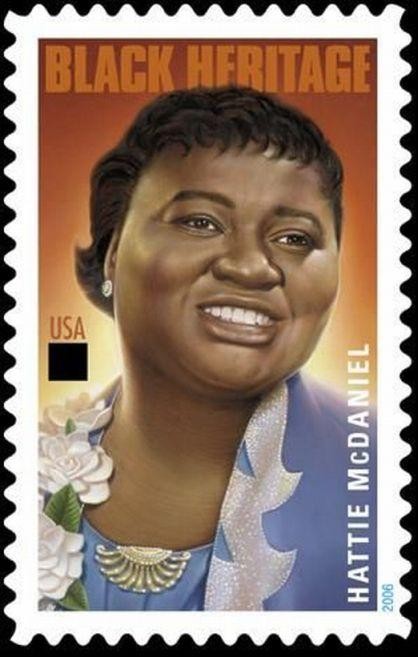
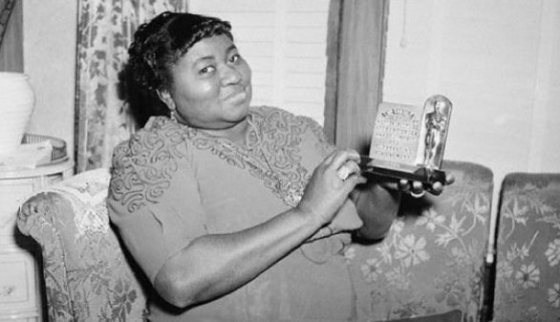

A remarkable woman. Wonderful tribute.
Thanks, Michael. She deserves lots of accolades.
Aurora
Great post and tribute to a fine lady. I’m glad she had continued success on radio and Tv. Wonder why the film rolled dried up. Thanks for all the film clips too.
So glad you like this! 🙂 She’d been so stereotyped they didn’t offer her any other kinds of roles when people complained about the maids she’d been playing as times changed.
Aurora
I learned a great deal about Hattie from this piece. Great post!
Thanks so much, Maegan!
Aurora
I was disappointed that TCM hadn’t included “Judge Priest” in the lineup honouring Hattie. Thanks for the clip.
I loved that clip and was glad to find it! I’ve yet to see that movie.
Aurora
Thank you so much for the Judge Priest clip. I really enjoyed hearing her sing. And your factoid about the 1939/40 Oscar ceremony was sobering — I hadn’t realized that she was the first person of color to ever attend. Her contribution to GWTW is immense. To younger audiences, who aren’t familiar with Gable as the King of Hollywood, she humanizes and ennobles him. When Rhett says that Mammy is one of the few people whose opinion matters to him, we realize that there’s more honor to this “blackguard” than to many of the “gentlemen” of Atlanta.
So true! Thanks for your comments. I love her relationship with Rhett. The red petticoat scene!!
Aurora
Verklempt! Oh how I love her, I always have, but I learned from this post too. I’m so glad you found these clips and shared them. I’ve enjoyed her day today so much…..I find though, that I want to see more of her in these movies. So having this post today has been so welcome.
Am watching “Gone with the Wind” now. Hattie McDaniel has all the best lines, doesn’t she? I get impatient to see her on the screen again! (Really, it’s too bad the movie couldn’t be about her, instead of Scarlett O’Hara…who really is kind of an idiot.)
Thanks for this tribute to a remarkable woman.
Hattie. One of the all-time best. Thank you for a lovely pictorial tribute to her.
Hattie was a great performer and showed what could be achieved by one person even though many of society’s rules were stacked against her. If you want to know more about Hattie’s life and career have a listen to episode 7 of the podcast Classic Hollywood MTC which can be found on ITunes, Stitcher, Tune-in and Castbox. It can also be accessed via the following link: https://itunes.apple.com/gb/podcast/classic-hollywood-mtc-podcasts/id1137457686?mt=2